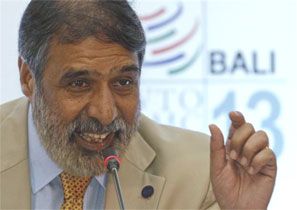Commerce and Industry Minister Anand Sharma believes the decision taken on Friday at the ninth ministerial conference of the World Trade Organization (WTO) at Bali gives India the freedom to launch food security programmes. In an interview with Nayanima Basu as the talks came to a close, a visibly elated Sharma said the decision gave India complete protection even if it breached the food subsidy limit under WTO rules. Excerpts:
 Does the decision taken at Bali on Friday give India a complete freehand in launching food security programmes?
Does the decision taken at Bali on Friday give India a complete freehand in launching food security programmes?
Food security is not part of trade negotiations. This is sovereign space. This deals with the procurement part and not consumption. But it ring-fences us completely — it ring-fences us against any breach, any action when it comes to de minimis, which we would breach because of the huge procurement.
So you admit there will be huge procurement in future. Will you be able to silence the critics then?
Critics should reflect that it is not only us, but there are other countries in the world that do the same and they cannot question the collective wisdom of all such countries. We were able to develop a strong coalition of developing countries from Asia, Latin America and Caribbean, which has demonstrated its unity and solidarity.
Do you see this as a landmark decision?
It is historic but it’s also a landmark for the WTO as the first major decision made in the 21st century on global trade, particularly after the commencement of the Doha Round of trade negotiations.
What India was steadfast about from the beginning was to have a horizontal balance in the Bali package and to ensure not only India’s own food security programme but also the public stock-holding for food security programmes by developing and poor countries. That right was recognised and secured. This has been achieved. And what India had said is that the umbilical linkage between interim and permanent is there.
This is exactly what we had demanded. This is a path-breaking decision since the establishment of the WTO.
Does this mean the Agreement on Agriculture (AoA) under WTO will now be amended?
There have been ongoing negotiations. The previous agreement based on the Uruguay round is inherently imbalanced and biased against developing countries; that is why support was mobilised and it became an imperative to launch a new round of negotiations, that is the Doha Development Round. The Doha round was reaching nowhere.
This is the ninth agreement of the WTO and this is the first agreement that reinforces the centrality of the WTO as an organisation and this is the first harvest of the only trade round dedicated to development.
Does this event at Bali mark the relaunch of the Doha round or does it overshadow it?
The Doha round remains... This is integral to Doha. It is called the first harvest, or early harvest. And in this, we insisted for a horizontal balance, which is what India’s demand was.











